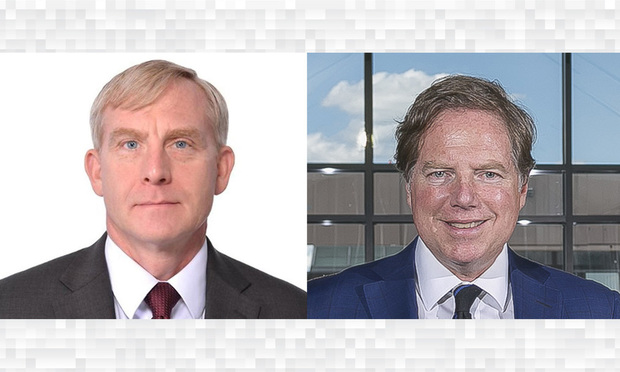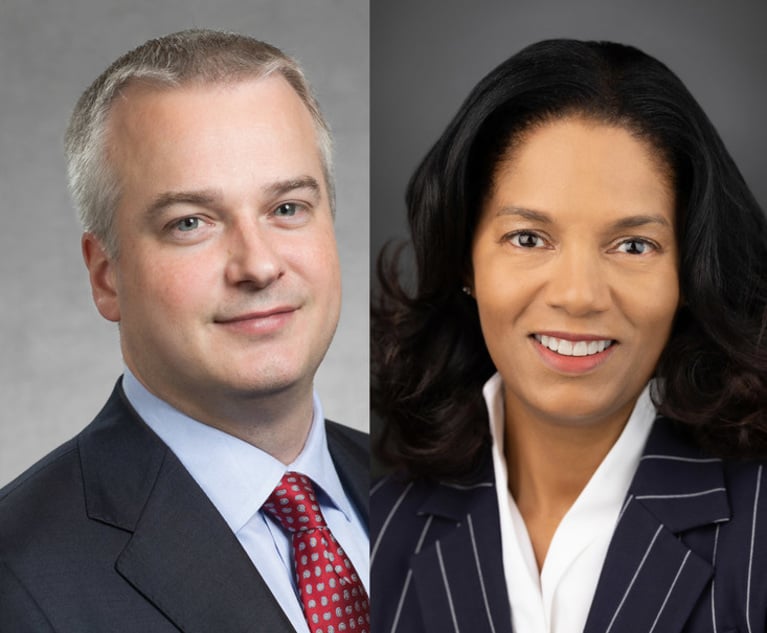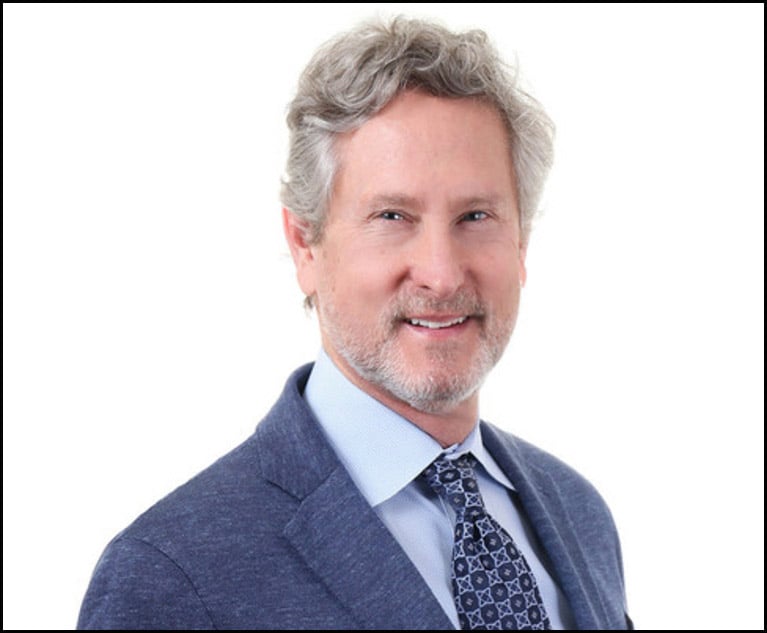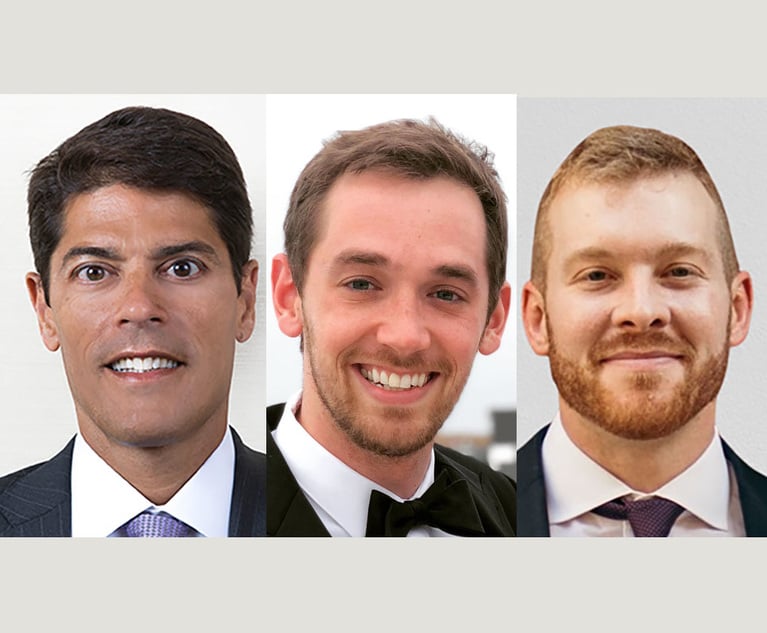Daily Dicta: The Good News (and Bad) About New U.S. Attorneys; Gibson Dunn Gets an A+
There's good news and bad in the list of 17 interim U.S. Attorneys appointed by Attorney General Jeff Sessions on Wednesday. The good: The Eastern…
January 04, 2018 at 02:18 PM
9 minute read
 Left to right: Richard Donoghue and Geoffrey Berman
Left to right: Richard Donoghue and Geoffrey Berman
There's good news and bad in the list of 17 interim U.S. Attorneys appointed by Attorney General Jeff Sessions on Wednesday.
The good: The Eastern District of New York went to Richard Donoghue, an 11-year veteran of the office and most recently senior vice president and chief litigation lawyer at CA Technologies.
Newsday reports Donoghue “was clearly the most popular choice among alumni of the office, local law enforcement officials and Sen. Chuck Schumer.” He reportedly beat out Kasowitz Benson Torres partner Edward McNally for the post.
My issue with McNally is not is his qualifications—he has deep prosecutorial experience. It's that he interviewed with Donald Trump for the job, per Politico and CNN.
So did Geoffrey Berman, the Greenberg Traurig partner tapped as interim U.S. Attorney for the Southern District of New York.
As I've noted before, this is troubling.
Granted, Berman is serving on an interim basis. President Trump has 120 days to submit permanent nominations for Senate confirmation.
Still, as Preet Bharara put it, “It is neither normal nor advisable for Trump to personally interview candidates for U.S. Attorney positions, especially the one in Manhattan.”
Because U.S. Attorneys are supposed to be impartial, administering the law without undue political influence. They serve at the pleasure of the president, but they don't serve the president.
It hardly seems coincidental that the three U.S. Attorney's offices where Trump reportedly interviewed potential appointees were Washington D.C. (where he met with Jessie Liu prior to her appointment), Manhattan and Brooklyn—the same offices that would seem most likely to investigate Trump, his associates or his companies.
That seems a bit too cozy for comfort.
The other interim heads include Gibson, Dunn & Crutcher partner Nick Hanna for the Central District of California and Craig Carpenito for the District of New Jersey. He joins from Alston & Bird, where he was a co-chair of the firm's litigation and trial practice group and its government and internal investigations team.
Kenji Price of Alston Hunty Floyd & Ing got the nod as interim U.S. Attorney for Hawaii. In Detroit, Matthew Schneider, a top aide to state Attorney General Bill Schuette, will be the interim top prosecutor.
One oddity: Dayle Elieson was tapped for the District of Nevada, but is currently a prosecutor in Texas. According to online records, she is not a member of the Nevada state bar.
Gretchen Shappert, interim head of the District of the Virgin Islands, was the U.S. Attorney for the Western District of North Carolina from 2004 to 2009 and went on to work at the Executive Office of U.S. Attorneys.
The other interim heads are all former first assistant U.S. Attorneys or AUSAs. Most have been running the offices on an acting basis already. They are:
Shawn Anderson — Districts of Guam and the Northern Mariana Islands
Gregory Brooker — District of Minnesota
Stephen Dambruch — District of Rhode Island
Duane Evans — Eastern District of Louisiana
Timothy Garrison — Western District of Missouri
Joseph Harrington — Eastern District of Washington
Grant Jaquith — Northern District of New York
Maria Chapa Lopez — Middle District of Florida
Alexander Van Hook — Western District of Louisiana
 Gibson-Dunn-Crutcher
Gibson-Dunn-CrutcherAn A+ for Gibson Dunn
In the sea of law firm client alerts and year-in-review publications, here's one that stands apart: Gibson, Dunn & Crutcher's analysis of the Foreign Corrupt Practices Act.
The anti-corruption law turned 40 in December. In honor of the birthday, the firm on Wednesday unveiled a comprehensive review of FCPA cases and stats, plus some interesting frontline insights.
To wit: “There is an energy in the hallways of the Bond Building, where DOJ's FCPA Unit is staffed with a driven and relatively young team of prosecutors—clocking in at a median age just shy of 40, most were not alive when the statute was signed into law. Led by the articulate and indefatigable Dan Kahn, the majority of the 31 attorneys currently assigned to the unit attended elite law schools, nearly 70 percent completed prestigious federal judicial clerkships early in their careers, and while more than 80 percent have private practice experience, the majority started with prior prosecutorial experience.
“Charles Cain, a quick study who distills complicated scenarios effortlessly, just this year assumed leadership of the SEC's FCPA Unit. His attorneys likewise have deep experience, with the majority of the 31 attorneys joining the unit from other positions at the SEC and nearly half having spent five years or more in the unit.”
Gibson Dunn reports that in 2017, there were 39 combined DOJ/ SEC enforcement actions—down from 53 in 2016, but still more than any year between 2012 and 2015. Fifteen defendants were sentenced on FCPA and FCPA-related charges last year.
Since the law's inception, the largest number of enforcement actions have involved China, followed by Nigeria, Mexico, Indonesia and Iraq.
Read the full report here.
On the Side of Angels
In other Gibson Dunn news, partner Tom Dupree racked up a significant win before the Massachusetts Supreme Judicial Court.
Dupree represented H. Fisk Johnson III, the head of S.C. Johnson & Son (and one of the wealthiest people in the United States) in connection with his investment in biotech startup Genitrix, LLC.
The plaintiff, Genitrix co-founder Andrew Segal, was the company's president and sole officer. When Genitrix began to fail, Segal chose to forego a salary, but later sued Johnson and Stephen Rose, who was appointed by Johnson to Genitrix's board of directors. (Rose was also represented by Gibson Dunn.)
Segal demanded unpaid wages, claiming that the Wage Act made Johnson and Rose responsible for his salary as “agents having the management” of the company.
A jury found Johnson and Rose were liable for Segal's wages, as well as treble damages, prejudgment interest, attorney fees and costs.
Had the verdict stood, it could have been a killer for angel investors in Massachusetts—because who wants to invest in a risky start-up if you're going to be personally liable for paying the workers if it fails?
Dupree convinced the Massachusetts high court to take the case for direct appellate review, bypassing the intermediate court.
On Dec. 28, he won across the board.
The Wage Act “does not impose personal liability on board members, acting only in their capacity as board members, or investors engaged in ordinary investment activity,” the Massachusetts high court found. “Rather, to impose such liability, the statute requires that the defendants be 'officers or agents having the management' of a company.”
Lateral Watch
Sidley Austin snapped up Brian Stretch, the U.S. Attorney for the Northern District of California. A career prosecutor, he remained on the job even after Donald Trump took office.
Stretch (whose brother is Facebook GC Colin Stretch) will join Sidley's San Francisco office in February, working on internal investigations for the firm's technology, life sciences and financial services clients in the region. Why Sidley? “It was important to me to identify a firm whose values I shared,” he told my colleague Ross Todd. Read the full story here, including a list of frontrunners to replace Stretch as U.S. Attorney.
More Legal News
Manafort Lawsuit Challenges Mueller's Broad Authority as Special Counsel
Good luck with that.
'Loose' Accusation of Prosecutorial Misconduct Draws Federal Court's Lament
“While attorneys must zealously represent their clients, we lament the willingness of Lanier's counsel to distort the record and challenge opposing counsel's integrity with accusations that (in our view) could not have been made in good faith.”
$38M Fee Request in Anthem Data Breach Settlement Under Scrutiny
$360 an hour for contract attorneys?
Lobbyist, Suing Her Firm, Says She Was Fired After Signing Anti-Harassment Letter
She was the third to sign a letter that called for an end to “systemic” sexual misconduct in California's capital.
Ad Firm Fetch Fires Back at Uber With Accusations of Forum-Shopping
“Uber seeks to blame Fetch for the risks it took on, and for responsibilities Fetch never had,” wrote Fetch counsel from Quinn Emanuel Urquhart & Sullivan.
PHH Mortgage to Pay $45M to Settle Multistate Litigation
The company admitted no wrongdoing and said it had already made most of the changes that are required under the agreement—not as if that stopped practically every state AG in the country from issuing a triumphant press release.
Berger & Montague Names First Chairwoman, Savett
Sherrie Savett also leads the legal team representing Philadelphia in a high-profile lending bias case against Wells Fargo.
This content has been archived. It is available through our partners, LexisNexis® and Bloomberg Law.
To view this content, please continue to their sites.
Not a Lexis Subscriber?
Subscribe Now
Not a Bloomberg Law Subscriber?
Subscribe Now
NOT FOR REPRINT
© 2025 ALM Global, LLC, All Rights Reserved. Request academic re-use from www.copyright.com. All other uses, submit a request to [email protected]. For more information visit Asset & Logo Licensing.
You Might Like
View All
Litigators of the Week: A Trade Secret Win at the ITC for Viking Over Promising Potential Liver Drug

Litigation Leaders: Mark Jones of Nelson Mullins on Helping Clients Assemble ‘Dream Teams’

Litigators of the Week: Ingersoll Rand Enforces a Noncompete Against an Exec Who Jumped Ship to Verboten Competitor

Litigator of the Week: After Years Repping Prenatal Testing Client, First-Time First Chair Lands a $57M Patent Damages Verdict
Trending Stories
- 1Who Are the Judges Assigned to Challenges to Trump’s Birthright Citizenship Order?
- 2Litigators of the Week: A Directed Verdict Win for Cisco in a West Texas Patent Case
- 3Litigator of the Week Runners-Up and Shout-Outs
- 4Womble Bond Becomes First Firm in UK to Roll Out AI Tool Firmwide
- 5Will a Market Dominated by Small- to Mid-Cap Deals Give Rise to a Dark Horse US Firm in China?
Who Got The Work
J. Brugh Lower of Gibbons has entered an appearance for industrial equipment supplier Devco Corporation in a pending trademark infringement lawsuit. The suit, accusing the defendant of selling knock-off Graco products, was filed Dec. 18 in New Jersey District Court by Rivkin Radler on behalf of Graco Inc. and Graco Minnesota. The case, assigned to U.S. District Judge Zahid N. Quraishi, is 3:24-cv-11294, Graco Inc. et al v. Devco Corporation.
Who Got The Work
Rebecca Maller-Stein and Kent A. Yalowitz of Arnold & Porter Kaye Scholer have entered their appearances for Hanaco Venture Capital and its executives, Lior Prosor and David Frankel, in a pending securities lawsuit. The action, filed on Dec. 24 in New York Southern District Court by Zell, Aron & Co. on behalf of Goldeneye Advisors, accuses the defendants of negligently and fraudulently managing the plaintiff's $1 million investment. The case, assigned to U.S. District Judge Vernon S. Broderick, is 1:24-cv-09918, Goldeneye Advisors, LLC v. Hanaco Venture Capital, Ltd. et al.
Who Got The Work
Attorneys from A&O Shearman has stepped in as defense counsel for Toronto-Dominion Bank and other defendants in a pending securities class action. The suit, filed Dec. 11 in New York Southern District Court by Bleichmar Fonti & Auld, accuses the defendants of concealing the bank's 'pervasive' deficiencies in regards to its compliance with the Bank Secrecy Act and the quality of its anti-money laundering controls. The case, assigned to U.S. District Judge Arun Subramanian, is 1:24-cv-09445, Gonzalez v. The Toronto-Dominion Bank et al.
Who Got The Work
Crown Castle International, a Pennsylvania company providing shared communications infrastructure, has turned to Luke D. Wolf of Gordon Rees Scully Mansukhani to fend off a pending breach-of-contract lawsuit. The court action, filed Nov. 25 in Michigan Eastern District Court by Hooper Hathaway PC on behalf of The Town Residences LLC, accuses Crown Castle of failing to transfer approximately $30,000 in utility payments from T-Mobile in breach of a roof-top lease and assignment agreement. The case, assigned to U.S. District Judge Susan K. Declercq, is 2:24-cv-13131, The Town Residences LLC v. T-Mobile US, Inc. et al.
Who Got The Work
Wilfred P. Coronato and Daniel M. Schwartz of McCarter & English have stepped in as defense counsel to Electrolux Home Products Inc. in a pending product liability lawsuit. The court action, filed Nov. 26 in New York Eastern District Court by Poulos Lopiccolo PC and Nagel Rice LLP on behalf of David Stern, alleges that the defendant's refrigerators’ drawers and shelving repeatedly break and fall apart within months after purchase. The case, assigned to U.S. District Judge Joan M. Azrack, is 2:24-cv-08204, Stern v. Electrolux Home Products, Inc.
Featured Firms
Law Offices of Gary Martin Hays & Associates, P.C.
(470) 294-1674
Law Offices of Mark E. Salomone
(857) 444-6468
Smith & Hassler
(713) 739-1250






